Case Study: An Ethical Perspective to Competing Stakeholder Interests
Background
Starbucks News Release (PDF)
News Article 1 (PDF)
News Article 2 (PDF)
In March 2012, National Organization for Marriage launched a global campaign called “Dump Starbucks,” urging people to boycott Starbucks. The organization claims that by advocating same-sex marriage, Starbucks offended “at least half of its U.S. customers and the vast majority of its international customers” (Dump Starbucks, 2016). National Organization for Marriage (NOM) is a nonprofit organization with a mission “to protect marriage and the faith communities that sustain it” (NOM About Us, 2016). Founded in 2007 as an organized opposition to same-sex marriage in state legislatures, NOM serves as a national resource for marriage-related initiatives at the state and local level.
In January 2012, Starbucks joined Microsoft and Nike in announcing support of a Washington state bill to legalize same-sex marriage, which ultimately passed. In response, NOM has targeted Starbucks through its "Dump Starbucks" boycott and various campaigns including a full-fledged social media campaign. The organization has launched a website called “Dump Starbucks” (www.dumpstarbucks.com/) and created a Facebook account (www.facebook.com/dumpstarbucks/). As of November 2016, its Twitter account @dumpstarbucks has 11.1K followers and its Dumb Starbucks petition has received 71,204 pledges.
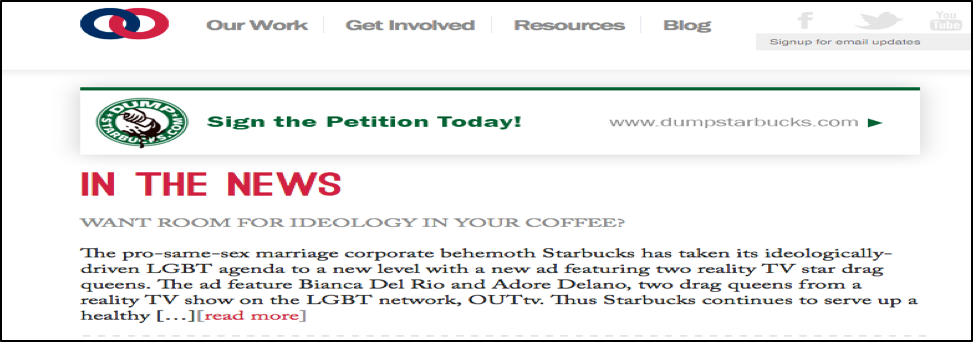
Source: https://www.nationformarriage.org/main/ourwork/dump-starbucks
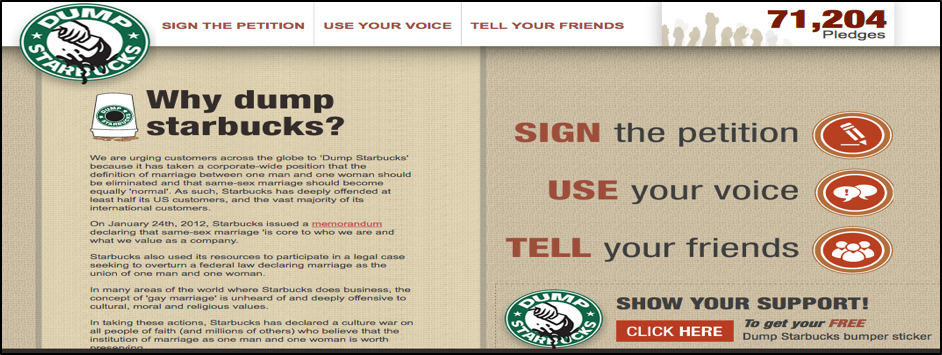
Source: http://www.dumpstarbucks.com/

Source: https://www.facebook.com/NationForMarriage
In addition, the organization has promoted a parody coffee shop called “Dumb Starbucks” to boycott Starbucks.
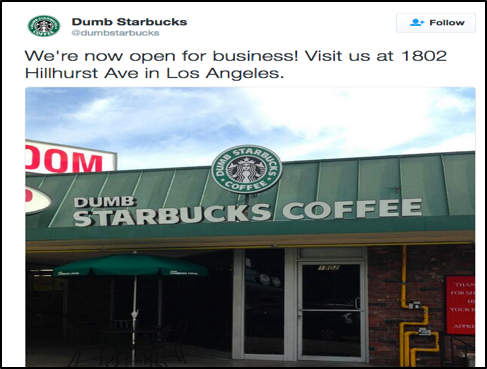
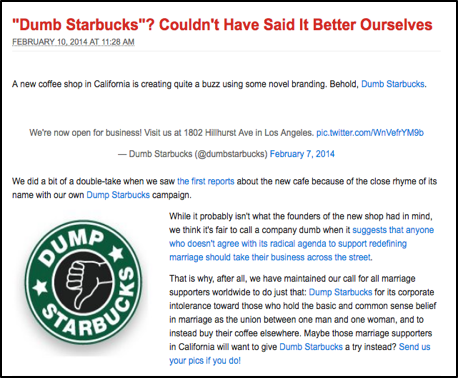
Source: http://www.usatoday.com/story/news/nation-now/2014/02/10/dumb-starbucks-parody-free-coffee/5357597/
NOM’s campaign has attracted other conservative organizations. In March 2013, TheTeaParty.net, the largest Tea Party organization, joined the campaign and shared the link on its Facebook, which attracted more over 1.6 million “Likes” and garnered thousands of comments (Delgado, 2013).
Dilemma
At Starbucks’ 2013 annual shareholder meeting in Seattle, investor-analyst Tom Strobhar, who is also the founder of The Corporate Morality Action Center, asked Howard Schultz whether the company’s support for same-sex marriage was hurting its stock price. Strobhar attributed his disappointment in Starbucks stock to NOM’s boycott:
It's my understanding, something like tens of thousands of people signed on this particular boycott. And then the [first quarter] after this boycott was announced, our sales and our earnings ... were [a] bit disappointing. Until January a year ago, we existed without making gay marriage a core value of our company. Hence we did quite well. (Stuart, 2013)
In essence, investor Strobhar was asking whether it was prudent to risk all shareholders on a controversial social issue that may not directly affect the company.
Course of Action
In response, Schultz noted that the company’s decision was not about economics but about embracing diversity, adding:
The lens in which we are making that decision is through the lens of our people. We employ over 200,000 people in this company, and we want to embrace diversity. Of all kinds…If you feel, respectfully, that you can get a higher return than the 38 percent you got last year, it’s a free country. You can sell your shares of Starbucks and buy shares in another company. Thank you very much. (Allen, 2013)
Schultz’s response to Strobhar is aligned with the company’s established inclusion and diversity policy:
At the heart of our business, we seek to inspire and nurture the human spirit - understanding that each person brings a distinct life experience to the table. Our partners are diverse not only in gender, race, ethnicity, sexual orientation, disability, religion and age, but also in cultural backgrounds, life experiences, thoughts and ideas. (Starbucks Diversity & Inclusion, 2016)
Furthermore, Starbucks explains its diversity policy from an economic argument:
Embracing diversity only enhances our work culture, it also drives our business success. It is the inclusion of these diverse experiences and perspectives that create a culture of empowerment, one that fosters innovation, economic growth and new ideas. (Starbucks Diversity & Inclusion, 2016)
Indeed, Starbucks has long been a supporter of same-sex marriage as part of its CSR commitment (Lii & Lee, 2012). In 2011, the company was among a group of 70 businesses and organizations that filed a brief in federal court opposing the Defense of Marriage Act, which restricts the definition of marriage to that between a man and a woman (Allen, 2013).
Consequences
It is difficult to determine whether NOM boycott had any direct effect on the company’s bottom line but, based on share price, it does not appear to have had an impact. The day NOM announced its boycott, Starbucks shares were trading at about $53 a share. One month later, shares were trading at about $58 a share. However, Starbucks’ earnings, while strongly positive, came in below analysts’ estimates (BrandIndex, 2013). This exchange at the Starbucks’ annual shareholder accelerated the debate and garnered more attention. On Twitter some expressed their plans to #BoycottStarbucks:


Source: http://www.usatoday.com/story/news/nation-now/2014/02/10/dumb-starbucks-parody-free-coffee/5357597/
Many conservative media have also used Schultz’s response to support their point of view:
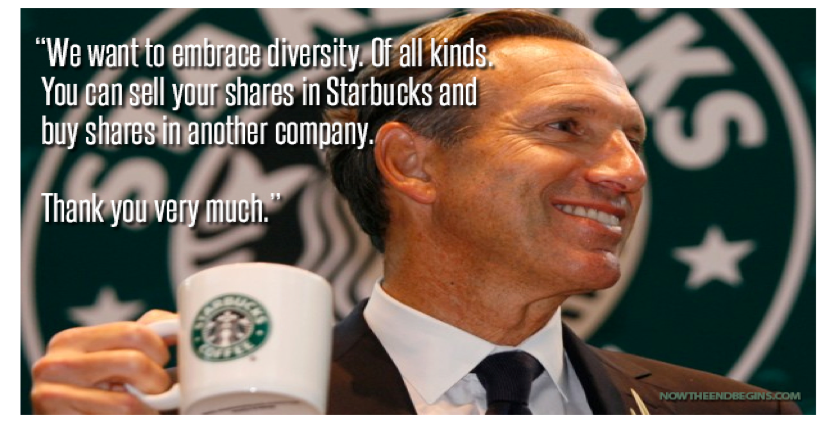
Source: Grider, G. (October 2, 2014). Starbucks Howard Schultz Tells Anti-Gay Marriage Christians To ‘Sell Your Shares. Now the End Begins. http://www.nowtheendbegins.com/starbucks-howard-schultz-tells-anti-gay-marriage-christians-sell-shares-video/
Moral of the Story
From a business view, corporate managers should prioritize shareholder demands, as they possess power, legitimacy, and urgency (Mitchell et al., 1997). Nevertheless, Starbucks’ stand for same-sex marriage, in spite of the bottom-line concerns, challenges the traditional understanding of ethical or proper corporate behavior. Closely related to CSR, corporate ethics include all five elements: honesty, respect, fairness, compassion, and responsibility.
Diversity and inclusion have increasingly become social issues in the domain of CSR that require an ethical treatment. Because of Starbucks’ strong advocacy for social issues, the company has often pushed the boundaries of the role of business in society. By tackling controversial social issues like gun control, gay marriage and, recently, race, Starbucks has gone beyond traditional CSR, the company actively advocates for social change.
This case presents a unique challenge for corporate managers and public relations professionals, as shareholders play a dual role as the owners of a public company and activists. Unlike, conventional activists, they have a direct access to top management to voice their grievances. This case study resides at the intersection of management, public relations and social activism, and provides important insights into the boundaries of corporate social responsibility.
Next Page: Lesson 1 Assessment